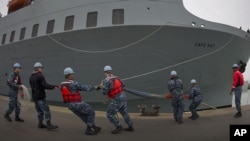BRUSSELS —
Talks between NATO and Russia on a possible joint mission to protect a U.S. ship that will destroy Syria's deadliest chemical weapons are moving ahead despite tensions over Ukraine, a top U.S. commander said on Thursday.
U.S. Air Force General Philip Breedlove, commander of U.S. forces in Europe, said NATO and Russia were discussing a possible joint naval operation in the Mediterranean to protect the U.S. cargo ship Cape Ray due to destroy Syria's toxins.
News of the discussions between NATO and Russia in a joint body called the NATO-Russia Council was first reported by Reuters on February 14.
“We are in negotiations right now in the NATO-Russia Council and those negotiations are moving forward,” Breedlove said in an interview with Reuters and The Wall Street Journal.
He said discussions on what would be a rare example of military cooperation between Russia and NATO had not been affected by any tensions over the Ukraine crisis.
Under a U.S.-Russian deal reached after a chemical weapons attack killed hundreds of people around Damascus last year, President Bashar al-Assad's government should have handed over 1,300 tons of toxic chemicals by Feb. 5 for destruction abroad.
But only a handful of cargoes have been shipped out of the country so far, causing growing international frustration at the slow progress.
U.S. ready now
Syria has agreed a new timetable to remove its chemical weapons by late April, diplomats said on Wednesday.
Breedlove stressed that the United States was ready to carry out the mission to destroy the chemicals immediately.
“We are ready to do this mission today, right now. The Syrians need to deliver these chemicals for destruction and we are ready to destroy them now,” he said.
Under the plan being discussed, NATO and Russian warships would share the task of protecting the Cape Ray, which will process at sea about 500 tons of chemicals that are too dangerous to deal with on land.
The Cape Ray is to pick up the chemicals in Italy and needs an escort for its dangerous cargo in international waters.
Breedlove, who is also NATO's Supreme Allied Commander Europe but was speaking in his U.S. capacity, said there were various options for escorting the Cape Ray.
The United States could carry out the entire mission by itself or the Cape Ray could be supported by NATO and Russia working together, by NATO or by a coalition of NATO allies not acting under the NATO flag.
Russian participation in the mission would not be merely symbolic, Breedlove said.
“I think it would be good for our nations to find a path ahead to build bridges,” he said.
He said Russian help would also be appreciated during the operation to destroy the chemicals, which other officials have said will take around 90 days.
U.S. Air Force General Philip Breedlove, commander of U.S. forces in Europe, said NATO and Russia were discussing a possible joint naval operation in the Mediterranean to protect the U.S. cargo ship Cape Ray due to destroy Syria's toxins.
News of the discussions between NATO and Russia in a joint body called the NATO-Russia Council was first reported by Reuters on February 14.
“We are in negotiations right now in the NATO-Russia Council and those negotiations are moving forward,” Breedlove said in an interview with Reuters and The Wall Street Journal.
He said discussions on what would be a rare example of military cooperation between Russia and NATO had not been affected by any tensions over the Ukraine crisis.
Under a U.S.-Russian deal reached after a chemical weapons attack killed hundreds of people around Damascus last year, President Bashar al-Assad's government should have handed over 1,300 tons of toxic chemicals by Feb. 5 for destruction abroad.
But only a handful of cargoes have been shipped out of the country so far, causing growing international frustration at the slow progress.
U.S. ready now
Syria has agreed a new timetable to remove its chemical weapons by late April, diplomats said on Wednesday.
Breedlove stressed that the United States was ready to carry out the mission to destroy the chemicals immediately.
“We are ready to do this mission today, right now. The Syrians need to deliver these chemicals for destruction and we are ready to destroy them now,” he said.
Under the plan being discussed, NATO and Russian warships would share the task of protecting the Cape Ray, which will process at sea about 500 tons of chemicals that are too dangerous to deal with on land.
The Cape Ray is to pick up the chemicals in Italy and needs an escort for its dangerous cargo in international waters.
Breedlove, who is also NATO's Supreme Allied Commander Europe but was speaking in his U.S. capacity, said there were various options for escorting the Cape Ray.
The United States could carry out the entire mission by itself or the Cape Ray could be supported by NATO and Russia working together, by NATO or by a coalition of NATO allies not acting under the NATO flag.
Russian participation in the mission would not be merely symbolic, Breedlove said.
“I think it would be good for our nations to find a path ahead to build bridges,” he said.
He said Russian help would also be appreciated during the operation to destroy the chemicals, which other officials have said will take around 90 days.










